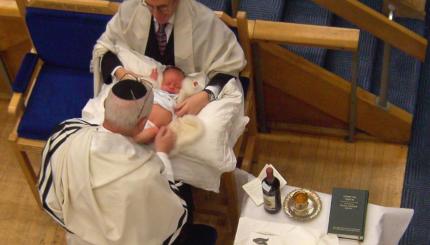Although full-fledged ceremonies of covenant, welcome, and naming for girls have only taken place since the 1970s, Jews have acknowledged the birth of — and formally given names to — their daughters in many ways over the centuries.
What’s In the Bible and Talmud
In the biblical text, boys’ and men’s names are often explained; girls’ and women’s rarely are, and more often than their male counterparts, female figures go unnamed for the reader. There is no prescribed covenantal ritual for girls parallel to that of brit milah (circumcision) for boys. Still, the laws of the ancient Temples in Jerusalem called for sacrifices of thanksgiving after the birth of a child of either sex — after 40 days for a boy, and after 80 days for a girl. The records the custom in ancient Israel of planting a cedar tree when a boy was born, and a cypress tree when a girl was born (Gittin 57a).
Folk Traditions
Across time and cultures, many folk traditions emerged for acknowledging the birth of a daughter, including the zeved ha-bat (“gift of a daughter”) and the German hollekreisch (a word of mysterious origin), in which children would raise up the cradle and call out “What shall your name be?”
The longest-standing tradition among Ashkenazic Jews (those of German and Eastern European origin) is for the father to come to the synagogue on the first after his daughter’s birth and receive an aliyah (the honor of reading the blessings before and after a portion of the public reading). Afterward, a prayer for healing is said for the new mother, and the baby’s name is publicly proclaimed. In many congregations today, this is still the custom, although in non-Orthodox congregations, often the mother also participates.

Help us keep Jewish knowledge accessible to millions of people around the world.
Your donation to My Jewish Learning fuels endless journeys of Jewish discovery. With your help, My Jewish Learning can continue to provide nonstop opportunities for learning, connection and growth.
Modern Simchat Bat and Brit Bat Ceremonies
The ancient rabbis and their successors through the medieval and modern periods did not conceive of a ceremony for a girl intended to parallel that for a boy, welcoming her into the covenant between God and the Jewish people — that would wait until the second half of the 20th century. The first known ceremony of welcoming, naming, and covenant for a girl was published in 1973. Similar ceremonies were emerging at about the same time in the Reform movement and in the context of the burgeoning wave of Jewish feminism. The creators of these ceremonies, which were quite varied, struggled with questions of liturgy (what prayers and blessings should be said?), ritual (what could be innovative–as ceremonies for girls had to be–yet resonate with the power of tradition?) and terminology (what should these new ceremonies be called?).
The most common names for these ceremonies are simchat bat (“celebrating a daughter”), brit bat (“a daughter’s covenant”), or in English, simply “a baby naming.” While the 1970s and early 1980s saw a blossoming of ceremonies for girls, this took place only among a relatively small number of Jews, sharing resources and ideas.
The mid-1980s and especially the 1990s saw greater interest, e.g., rabbi’s manuals began to include examples and guidelines for girls’ welcoming ceremonies. The publication in 2001 of the book Celebrating Your New Jewish Daughter: Creating Jewish Ways to Welcome Baby Girls into the Covenant was a sign that ceremonies for girls, while still not universal, had “arrived.”



